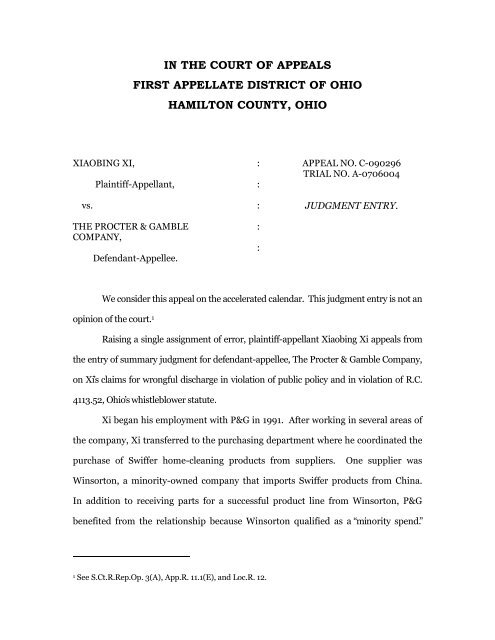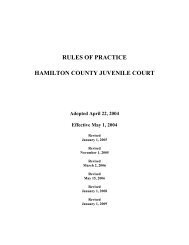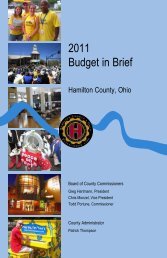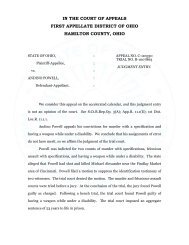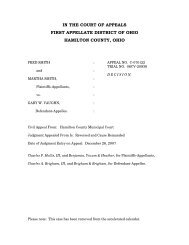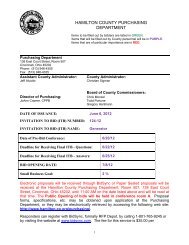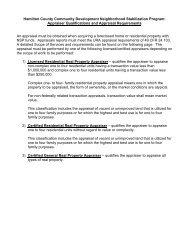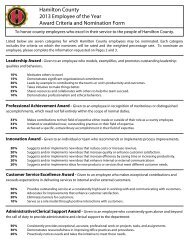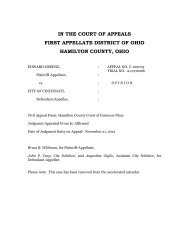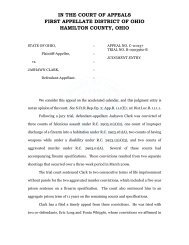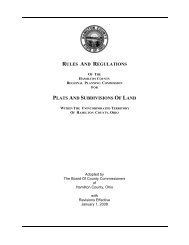Xi v. The Proctor & Gamble Co. - Hamilton County, Ohio
Xi v. The Proctor & Gamble Co. - Hamilton County, Ohio
Xi v. The Proctor & Gamble Co. - Hamilton County, Ohio
Create successful ePaper yourself
Turn your PDF publications into a flip-book with our unique Google optimized e-Paper software.
IN THE COURT OF APPEALS<br />
FIRST APPELLATE DISTRICT OF OHIO<br />
HAMILTON COUNTY, OHIO<br />
XIAOBING XI,<br />
vs.<br />
Plaintiff-Appellant,<br />
THE PROCTER & GAMBLE<br />
COMPANY,<br />
Defendant-Appellee.<br />
:<br />
:<br />
:<br />
:<br />
:<br />
APPEAL NO. C-090296<br />
TRIAL NO. A-0706004<br />
JUDGMENT ENTRY.<br />
We consider this appeal on the accelerated calendar. This judgment entry is not an<br />
opinion of the court. 1<br />
Raising a single assignment of error, plaintiff-appellant <strong>Xi</strong>aobing <strong>Xi</strong> appeals from<br />
the entry of summary judgment for defendant-appellee, <strong>The</strong> Procter & <strong>Gamble</strong> <strong>Co</strong>mpany,<br />
on <strong>Xi</strong>’s claims for wrongful discharge in violation of public policy and in violation of R.C.<br />
4113.52, <strong>Ohio</strong>’s whistleblower statute.<br />
<strong>Xi</strong> began his employment with P&G in 1991. After working in several areas of<br />
the company, <strong>Xi</strong> transferred to the purchasing department where he coordinated the<br />
purchase of Swiffer home-cleaning products from suppliers.<br />
One supplier was<br />
Winsorton, a minority-owned company that imports Swiffer products from China.<br />
In addition to receiving parts for a successful product line from Winsorton, P&G<br />
benefited from the relationship because Winsorton qualified as a “minority spend.”<br />
1 See S.Ct.R.Rep.Op. 3(A), App.R. 11.1(E), and Loc.R. 12.
OHIO FIRST DISTRICT COURT OF APPEALS<br />
P&G’s purchases from Winsorton counted towards P&G’s goal of promoting corporate<br />
diversity spending.<br />
On October 30, 2006, P&G terminated <strong>Xi</strong>’s employment because of his poor<br />
overall performance and because of his failure to make progress under a May 2006<br />
improvement plan. <strong>Xi</strong> maintained that P&G illegally terminated his employment because<br />
of his repeated reports to his P&G supervisors that the Winsorton relationship cost the<br />
company money and was maintained for the primary purpose of demonstrating<br />
compliance with federal minority-business-enterprise guidelines for government<br />
contractors.<br />
Because summary judgment presents only questions of law, we review the entry of<br />
summary judgment de novo, without deference to the trial court’s determinations. 2<br />
Summary judgment is proper pursuant to Civ.R. 56(C) when (1) no genuine issue of<br />
material fact remains to be litigated; (2) the moving party is entitled to judgment as a<br />
matter of law; and (3) it appears from the evidence that reasonable minds can come to but<br />
one conclusion, and with the evidence viewed most strongly in favor of the party against<br />
whom the motion for summary judgment is made, that conclusion is adverse to that<br />
party. 3<br />
When, as here, the party moving for summary judgment discharges its initial<br />
burden to identify the absence of genuine issues of material fact on an essential element of<br />
the nonmoving party’s claims, the nonmoving party then has a reciprocal burden of<br />
specificity and cannot rest on the allegations or denials in the pleadings, but must set forth<br />
“specific facts,” by the means listed in Civ.R. 56(C) and (E), showing that triable issues of<br />
fact exist. 4<br />
2 See Polen v. Baker, 92 <strong>Ohio</strong> St.3d 563, 564-565, 2001-<strong>Ohio</strong>-1286, 752 N.E.2d 258.<br />
3 See, also, Dresher v. Burt, 75 <strong>Ohio</strong> St.3d 280, 293, 1996-<strong>Ohio</strong>-107, 662 N.E.2d 264.<br />
4 See id. at 293, 1996-<strong>Ohio</strong>-107, 662 N.E.2d 264.<br />
2
OHIO FIRST DISTRICT COURT OF APPEALS<br />
<strong>Xi</strong> first contends that the trial court erred in entering summary judgment for P&G<br />
on his claim that P&G had terminated him in violation of <strong>Ohio</strong>’s whistleblower statute.<br />
That statute protects an employee from discipline or retaliatory action by his employer<br />
when the employee, in the course of his employment, becomes aware of and reports a<br />
legal violation that the employer has the authority to correct, and when the employee<br />
reasonably believes that the violation is either a criminal offense that is likely to cause an<br />
imminent risk of physical harm or a hazard to public health or safety, or a felony. 5<br />
But the employee is protected only under the following circumstances: (1) the<br />
employee provided oral notification of the violation to the employee’s supervisor or other<br />
responsible officer of the employer; (2) the employee subsequently filed with that<br />
supervisor a written report that provided sufficient detail to identify the violation; and (3)<br />
the employer failed to correct the violation or to make a reasonable and good-faith effort<br />
to correct the violation. 6 To be afforded protection as a whistleblower, an employee must<br />
strictly comply with the mandates of R.C. 4113.52. 7<br />
Even after construing the evidence in this case most strongly in <strong>Xi</strong>’s favor, we<br />
conclude that the activity <strong>Xi</strong> reported was not illegal activity, and that <strong>Xi</strong> had failed to<br />
provide a written report describing, in any detail, that activity to the same supervisor to<br />
whom he claims he had made an oral report.<br />
Since 2003, <strong>Xi</strong> had communicated his reservations that Winsorton was<br />
overcharging P&G. But while <strong>Xi</strong> adamantly questioned the wisdom of P&G’s decision to<br />
employ Winsorton as another layer in its Swiffer supply chain, <strong>Xi</strong> admitted to his<br />
supervisors and to Icy Williams, P&G’s corporate supply diversity leader, that the<br />
5 See R.C. 4113.52(A)(1)(a); see, also, Abrams v. Am. <strong>Co</strong>mputer Technology, 168 <strong>Ohio</strong> App.3d 362,<br />
2006-<strong>Ohio</strong>-4032, 860 N.E.2d 123, 34.<br />
6 See <strong>Co</strong>ntreras v. Ferro <strong>Co</strong>rp. (1995), 73 <strong>Ohio</strong> St.3d 244, 248-249, 652 N.E.2d 940; see, also,<br />
Abrams v. Am. <strong>Co</strong>mputer Technology at 35.<br />
7 Abrams v. Am. <strong>Co</strong>mputer Technology at 40, citing <strong>Co</strong>ntreras v. Ferro <strong>Co</strong>rp., syllabus.<br />
3
OHIO FIRST DISTRICT COURT OF APPEALS<br />
company’s decision was not illegal. He never denied that Winsorton was a legitimate<br />
minority-owned supplier that had been certified by the National Minority Supplier<br />
Development <strong>Co</strong>uncil and held certified by P&G’s own in-house review. While P&G might<br />
have been overpaying Winsorton to advance its goal of having its supply base reflect the<br />
diversity of its consumers, there was no evidence that Winsorton was not, in fact, a<br />
minority-owned business.<br />
Where the alleged illegal activity appears to be “more related to [the employee’s]<br />
problems with management” than to the reporting of illegal activity, the employee’s report<br />
of that activity can be construed as an internal management dispute, and the asserted<br />
wrongdoing is insufficient to gain the protections of the whistleblower statute. 8 Since <strong>Xi</strong><br />
did not demonstrate any illegal activity by P&G, he could not have been afforded the<br />
protections of the whistleblower statute. 9<br />
Moreover, <strong>Xi</strong>’s whistleblower claim also fails because he did not comply with the<br />
reporting requirements of the whistleblower statute.<br />
First, even if we assume, for<br />
purposes of argument only, that <strong>Xi</strong> had properly made an oral report of legally proscribed<br />
activity to Williams in early 2006, he did not subsequently file with her a written report<br />
detailing the alleged violations. <strong>Xi</strong> admitted that he made his written report detailing<br />
alleged wrongdoing not, as is required by the statute, 10 to Williams, but to his supervisor,<br />
Wade Shih.<br />
<strong>The</strong> written report to Shih also failed to provide sufficient detail to identify an<br />
actionable violation or to alert P&G to correct it. In fact, <strong>Xi</strong> concluded the report with a<br />
recommendation to “continue the Winsorton arrangement given the small amount of cost<br />
8 Haney v. Chrysler <strong>Co</strong>rp. (1997), 121 <strong>Ohio</strong> App.3d 137, 139, 699 N.E.2d 121; see, also, Cavico, Private<br />
Sector Whistleblowing and the Employment-At-Will Doctrine: A <strong>Co</strong>mparative Legal, Ethical, and<br />
Pragmatic Analysis (2004), 45 S.Tex.L.Rev. 543, 565.<br />
9 See Anders v. Specialty Chem. Resources, Inc. (1997), 121 <strong>Ohio</strong> App.3d 348, 359, 700 N.E.2d 39.<br />
10 See Haney v. Chrysler <strong>Co</strong>rp., 121 <strong>Ohio</strong> App.3d at 139, 699 N.E.2d 121; see, also, Abrams v. Am.<br />
<strong>Co</strong>mputer Technology at 35.<br />
4
OHIO FIRST DISTRICT COURT OF APPEALS<br />
and cash flow benefit.” <strong>Xi</strong>’s argument that he had been coerced to reach that conclusion<br />
was refuted by his own deposition testimony that Shih had left the decision whether to<br />
recommend staying with Winsorton up to <strong>Xi</strong>. Because we can only conclude from the<br />
evidence that <strong>Xi</strong> failed to comply with the detailed reporting requirements of the statute,<br />
he, again, could not have been afforded the protections of the whistleblower statute.<br />
Because no genuine issue of material fact remains with respect to <strong>Xi</strong>’s failure to comply<br />
with the mandates of R.C. 4113.52, the trial court properly entered summary judgment in<br />
favor of P&G on <strong>Xi</strong>’s whistleblower claim.<br />
<strong>Xi</strong> next argues that the trial court erred in entering summary judgment because<br />
P&G had wrongfully terminated him in violation of public policy for reporting his<br />
concerns about Winsorton.<br />
An at-will employee like <strong>Xi</strong> may be terminated without reason, so long as the<br />
termination is not contrary to law. 11 An exception to the employment-at-will doctrine<br />
exists where a termination is contrary to the clear public policy of <strong>Ohio</strong>. 12<br />
To prove wrongful termination in violation of public policy, a plaintiff must<br />
demonstrate four elements: (1) that a clear public policy existed and was manifested in a<br />
state or federal constitution, in a statute or administrative regulation, or in the common<br />
law (the clarity element); (2) that dismissing employees under circumstances like those<br />
involved in the plaintiff's dismissal would jeopardize the public policy (the jeopardy<br />
element); (3) that the plaintiff's dismissal was motivated by conduct related to the public<br />
policy (the causation element); and (4) that the employer lacked an overriding legitimate<br />
11 See Mers v. Dispatch Printing <strong>Co</strong>. (1985), 19 <strong>Ohio</strong> St.3d 100, 483 N.E.2d 150, paragraph one of the<br />
syllabus.<br />
12 See Greeley v. Miami Valley Maintenance <strong>Co</strong>ntrs., Inc. (1990), 49 <strong>Ohio</strong> St.3d 228, 551 N.E.2d 981,<br />
paragraph two of the syllabus.<br />
5
OHIO FIRST DISTRICT COURT OF APPEALS<br />
business justification for the dismissal (the overriding-justification element). 13 <strong>The</strong> clarity<br />
and jeopardy elements pose questions of law that are to be determined by the court. 14<br />
But a wrongful-termination claim does not survive summary judgment when the<br />
employee has not complied with the requirements of the whistleblower statute unless<br />
clear public policy itself places an affirmative duty on the employee, apart from the<br />
whistleblower statute, to report the violation, or unless clear public policy prohibits the<br />
employer from retaliation. 15<br />
<strong>Xi</strong> first argues that he was discharged in violation of public policy when he refused<br />
to participate in conduct that amounted to common-law fraud after complaining about<br />
P&G’s directive to continue business dealings with Winsorton. 16 While an employee who<br />
has been discharged for “refusal to participate in activities which arguably violate” a clear<br />
public policy has a claim for wrongful discharge, 17 here <strong>Xi</strong> acquiesced and did participate<br />
in the activity that he claimed violated public policy.<br />
Finally, <strong>Xi</strong>’s reliance upon the federal False Claim Act as a source of public policy<br />
separate from the policy embodied in the whistleblower statute is misplaced. <strong>The</strong> Act<br />
imposes civil liability upon “any person” who “knowingly presents * * * to * * * the United<br />
States Government * * * a false or fraudulent claim for payment.” 18 It also bars employers<br />
from retaliating against employees who take lawful acts in furtherance of a False Claims<br />
13 See <strong>Co</strong>llins v. Rizkana (1995), 73 <strong>Ohio</strong> St.3d 65, 69-70, 1995-<strong>Ohio</strong>-135, 652 N.E.2d 653; see, also,<br />
Leininger v. Pioneer Natl. Latex, 115 <strong>Ohio</strong> St.3d 311, 2007-<strong>Ohio</strong>-4921, 875 N.E.2d 36, 8-13.<br />
14 See id.<br />
15 See Dean v. <strong>Co</strong>nsol. Equities Realty #3, LLC, 182 <strong>Ohio</strong> App.3d 725, 2009-<strong>Ohio</strong>-2480, 914 N.E.2d<br />
1109, discretionary appeal not allowed, 123 <strong>Ohio</strong> St.2d 144, 2009-<strong>Ohio</strong>-5340, 914 N.E.2d 1064; see,<br />
also, Hale v. Volunteers of America, 158 <strong>Ohio</strong> App.3d 415, 2004-<strong>Ohio</strong>-4508, 816 N.E.2d 259.<br />
16 See Anders v. Specialty Chem. Resources, Inc., 121 <strong>Ohio</strong> App.3d at 355, 700 N.E.2d 39 (employee’s<br />
refusal to participate in conduct involving insurance fraud and falsification of insurance claims<br />
sufficient to defeat dismissal of his wrongful-termination claim).<br />
17 <strong>Co</strong>llins v. Rizkana, 73 <strong>Ohio</strong> St.3d at 71, 652 N.E.2d 653.<br />
18 See Vermont Agency of Natural Resources v. United States ex rel. Stevens (2000), 529 U.S. 765,<br />
769.<br />
6
OHIO FIRST DISTRICT COURT OF APPEALS<br />
Act action. 19 But since the protections under the federal act “are just a subset of the types of<br />
actions” protected by <strong>Ohio</strong>’s whistleblower statute, <strong>Xi</strong>’s wrongful-termination claim could<br />
not have survived summary judgment. 20 <strong>The</strong> assignment of error is overruled.<br />
<strong>The</strong>refore, the trial court’s entry of summary judgment is affirmed.<br />
Further, a certified copy of this judgment entry shall constitute the mandate, which<br />
shall be sent to the trial court under App.R. 27. <strong>Co</strong>sts shall be taxed under App.R. 24.<br />
HILDEBRANDT, P.J., CUNNINGHAM and DINKELACKER, JJ.<br />
To the Clerk:<br />
Enter upon the Journal of the <strong>Co</strong>urt on September 29, 2010<br />
per order of the <strong>Co</strong>urt _______________________________.<br />
Presiding Judge<br />
19 See Section 3730(h), Title 31, U.S.<strong>Co</strong>de.<br />
20 See Gossett v. Byron Prod. Inc. (S.D.<strong>Ohio</strong> 2005), 407 F.Supp.2d 918, 924; see, also, Hale v.<br />
Volunteers of America.<br />
7


